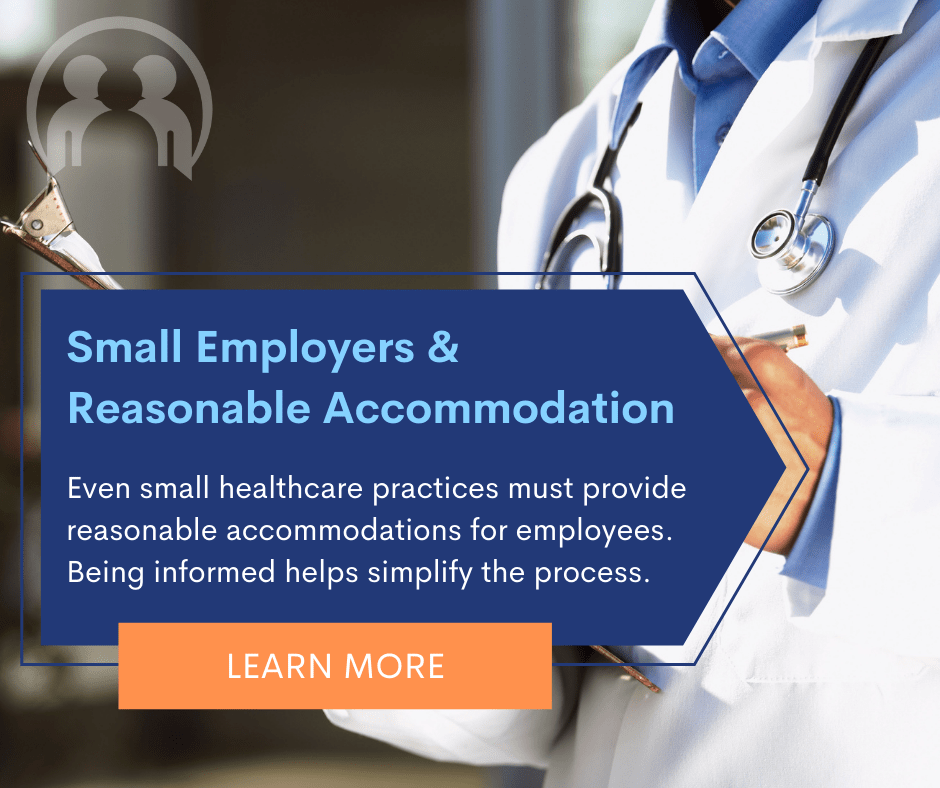Even small dental practices must provide reasonable accommodations for employees. While this may seem like a hurdle, being informed helps simplify the process.
Small Employers and Reasonable Accommodation
Imagine you’re a dentist looking for a new receptionist at your office and someone with a vision impairment applies. You have no problem considering the candidate and going through the interview process with them, but a few weeks later, you’re slapped with a lawsuit for not offering reasonable accommodation as a small employer during the interview process.
What happened? There are many potential answers, but perhaps the candidate needed an application with large print or braille instructions on an employment test. Failure to offer reasonable accommodations has the potential to bankrupt any medical practice. That’s why it’s essential for you to understand this federal law.
What Are Reasonable Accommodations for Small Employers?
“Reasonable accommodation” refers to changes that employers make to the work environment or the performance of essential duties. The Americans with Disabilities Act (ADA) brought about important changes in disability rights. One of these changes involved employers offering reasonable accommodation for people with disabilities.
Any company with at least 15 employees must abide by these rules, and unbeknownst to some, these accommodations are necessary even for non-employees. This could be something as simple as offering an ergonomic keyboard to your receptionist a dental hygienist offering reserved parking for certain employees or as extensive as purchasing a lift that helps a medical assistant in a wheelchair get into the office.
These are necessary to offer equal employment opportunities to those with disabilities unless such accommodations would cause “undue hardship” for the employer. The ADA lays out three types of reasonable accommodations:
- Changes involving the application/hiring process.
- Changes in how a job gets done or the work environment.
- Changes that allow people with disabilities to enjoy equal employment rights.
The first of these accommodations shows how a non-employee could put a medical practice in violation of the ADA. It’s essential to provide these accommodations when possible. With the expected influx of age discrimination lawsuits and potential new rules in the wake of COVID-19, medical practitioners must avoid putting their practice in danger by not offering reasonable accommodation.
What’s an Undue Hardship?
Another aspect of reasonable accommodations that baffle medical practitioners and small business owners are rules related to “undue hardships.” This is the one issue that could exempt a practice from having to follow certain regulations. If you’re still having issues with the concept of reasonable accommodations for small employers, feel free to reach out to us at HR for Health for more information.
If you understand the basics but wonder what an “undue hardship” is, though, you’re in the right place. Here are a few things to consider when deciding if a request falls into this category:
- The type of accommodation and the overall cost.
- Any impact the accommodation would have on the practice itself.
- Aspects such as financial resources, employees, and the effect an accommodation could have on resources.
There are nuances within these rules. While a large group dental practice may have to provide paid leave to accommodate an employee’s disability, for instance, a small town pharmacy with minimal resources may not have to.
The one thing to remember is that an undue hardship is not just an inconvenience. Accommodation must create a true hardship, and your practice must be able to prove that fact. Take time to really consider a reasonable accommodation request and be honest about whether it would cause an undue hardship.
Don’t Underestimate the Importance of Reasonable Accommodations
The ADA was an important step forward in disability rights, but it also created potential pitfalls for small employers. Whether you run a tiny dental practice or the largest optometry clinic in your city, it’s vital that you understand reasonable accommodations if your office meets the criteria. It’s not just the right thing to do; it’s also essential for staying in business.
Don’t let a simple mistake or oversight turn into a financial disaster for your practice. Schedule an HR consultation with HR For Health today so we can help keep your medical office compliant.
Did you know that we at HR for Health monitor all the specific laws and regulations that affect your practice? If you have questions about compliance issues, please reach out to us. Schedule a call, call (877) 779-4747, or email [email protected] now to learn more.
HR for Health is one of the nation’s leading Human Resources Management Systems (HRMS) used by small to mid-sized practices.
Quick note: This is not to be taken as legal or HR advice. Since employment laws change over time and can vary by location and industry, consult a lawyer or HR expert for specific guidance. Learn about HR for Health’s HR services.


